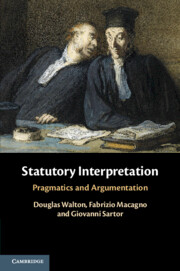Book contents
- Statutory Interpretation
- Statutory Interpretation
- Copyright page
- Dedication
- Contents
- Figures
- Tables
- Acknowledgments
- Introduction
- 1 Interpretation and Statutory Interpretation
- 2 Statutory Interpretation as Problem Solving
- 3 Interpretation and Pragmatics – Legal Ambiguity
- 4 Pragmatic Maxims and Presumptions in Legal Interpretation
- 5 Arguments of Statutory Interpretation and Argumentation Schemes
- 6 Classification and Formalization of Interpretative Schemes
- References
Introduction
Published online by Cambridge University Press: 29 December 2020
- Statutory Interpretation
- Statutory Interpretation
- Copyright page
- Dedication
- Contents
- Figures
- Tables
- Acknowledgments
- Introduction
- 1 Interpretation and Statutory Interpretation
- 2 Statutory Interpretation as Problem Solving
- 3 Interpretation and Pragmatics – Legal Ambiguity
- 4 Pragmatic Maxims and Presumptions in Legal Interpretation
- 5 Arguments of Statutory Interpretation and Argumentation Schemes
- 6 Classification and Formalization of Interpretative Schemes
- References
Summary
Statutory interpretation is a problem that is of crucial importance for legal practice and theory, political discussions, ethical issues, and public information. A substantial majority of the US Supreme Court’s case load involves statutory construction, nearly two-thirds of its docket by one recent estimate, and in the years ahead, courts will be asked to construe the meaning of thousands of sections of legislation. However, as Katzmann (2014, 3–10) emphasized, the interpretation of legal texts affects not only daily rulings in the courts at all levels, but even what have become political issues vital to the legal system such as televised confirmation hearings for US Supreme Court nominees. Statutes affect all aspects of our daily lives, including the most pressing public policy issues at a given time. However, although ideally the language of the statute should be clear, the texts passed by legislative bodies, such as the US Congress, can be vague, ambiguous, structurally complex in expression, or even apparently logically inconsistent. Fundamental values of our societies, emerging in the controversies on the issues of freedom of speech, abortion, marriage, or self-defense, are primarily debated as matters of interpretation.
- Type
- Chapter
- Information
- Statutory InterpretationPragmatics and Argumentation, pp. 1 - 16Publisher: Cambridge University PressPrint publication year: 2021



